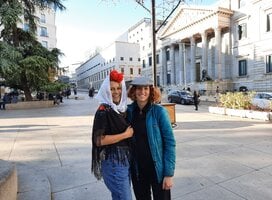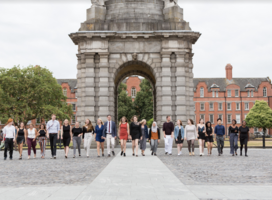Gap Year Programs in Madrid
The historical city of Madrid is a bustling metropolis overflowing with plazas, cafés, museums, universities, and discotecas—all the hallmarks of a major European capital. Even though Spain is currently in the throes of an economic crisis, that has not stopped thousands of foreigners from taking up residence in Madrid.
Whether you want to improve your Spanish, teach English, or just learn the art of siesta and eat some churros, Madrid is an exceptionally fascinating city brimming with exciting opportunities for those planning a gap year abroad. Take a stroll through the tree-lined paths in Retiro Park. Cheer on the Real Madrid soccer team at the renowned Bernabeu stadium. If you are an art aficionado, wander through the Reina Sofia museum and admire the complexity of Picasso’s Guernica. These are just but a few of the countless ideas for taking advantage of Madrid should you choose to do a gap year here.
Whether you plan to stay for a couple of weeks or a whole year, there is a variety of options available to make the most of your Madrid experience. Would you like to further your studies? Would you like to gain experience through an internship? Or would you like to volunteer? Below are some of the most popular choices for those considering a gap year in Madrid.
Being an Au Pair
This option tends to be more popular with girls than with boys, but this does not mean that guys can’t participate! In fact, some families prefer male au pairs over female au pairs, so don’t automatically cross this opportunity off your list just because you are a guy. Most people who want to be au pair usually apply for a position through an au pair agency, which then matches them with a family in the country of their choice. However, some people do not want to go through the screening of an agency and will simply create a profile on a free au pair website (much like a free online dating site), in which families can then contact them directly. Most families want a native English-speaking au pair who will teach their children English. When choosing your family, be wary of being taken advantage of and don’t hesitate to ask plenty of questions, ask for the previous au pair’s contact information, and be clear on what the family’s expectations are.
Learning Spanish
The advantages of not studying abroad through a university program include not having to worry about grades and earning college credit. During a gap year, you can choose the length, location, and type of program and learn Spanish at your own leisure. Language immersion programs like CESA Languages Abroad and Aspire by API have several kinds of options available and welcome all language levels from total beginner to the more advanced. Some programs last a few weeks while others last a full semester (3-4 months) or a full academic year. There is no shortage of language academies in Madrid and the selection may be a little overwhelming. A good place to start your search would be the Instituto Cervantes database in which you can search the type of language course you are interested in by region in Spain.
Teaching English
Teaching English is definitely one of the most popular options for those wanting to take a gap year in Spain. It is also one of the easiest ways to secure a visa and to obtain the ever important NIE (Spanish residency card), which means the holder can legally live and work in Spain. Many people become English language assistants through the North American Language and Culture Assistants run by the Spanish Ministry of Education. In order to apply for the program, you must have a BA and be a native speaker of English. The Ministry will then assign you a placement based on your application preferences and send you a stipend every month. Other English language assistant programs that will also sponsor your visa are BEDA, UCETAM, and CIEE (though CIEE usually places their participants in Andalusia and not Madrid). If you are TEFL/TESOL certified, you may want to look into applying at language academies, though this may be more difficult because very few will sponsor your visa unless you are a citizen of an EU country. However some may hire you under the table so it is worth looking into.
Internships
Interning abroad is one of the best ways to gain professional experience and to make your résumé stand out from the other candidates. (I should know, my stint abroad helped me get my current job!) It is also a fantastic way to improve your Spanish language skills. One of the best ways to search for an internship in Madrid (especially if you are not entirely confident with your level of Spanish) is to go through an internship placement agency such as Adelante or EPA. The agency will match you with an internship in your field of interest and will usually take care of housing and airport pickup. It is important to be aware that most internships are unpaid. You may receive a stipend from some companies, but don’t count on it.
Cost of Living
One of the advantages of living in Madrid is that it is definitely cheaper than other European countries. That being said, the cost of rent (and pretty much everything else) has risen in recent years due to the economic crisis. Depending on the kind of gap year you embark on, you may or may not have to rely on personal savings to get by. The average cost of living in Madrid is around 1000 Euros (about 1300 USD). This estimate includes rent, utilities, transportation, groceries, and personal leisure. If you want to make some extra money on the side, it is very easy to work under the table giving private English classes or to find a few families to babysit for.
Health and Safety in Madrid
Madrid is considered to be a safe city with a low crime rate, even though it was targeted by Al-Quaeda in the 2004 train bombings. Since the attack, security has been upped in the subway and there are surveillance cameras everywhere. (I took the metro every day and I never felt unsafe) There is also the Basque separatist group ETA which caused many bombings in the past. However, in recent years activity has declined, mostly because French and Spanish authorities have arrested many ETA activists. The usual rules apply when traveling to any foreign place: use good judgment and err on the side of caution.
Pick-pocketing is the most common crime directed against tourists. Be extra vigilant in heavily frequented tourist sites such as the Rastro flea market, Plaza Mayor, Puerta del Sol, and the metro. Never leave your belongings unattended—don’t put your purse on the back of your chair at an outdoor café or on the ground (my own purse got snatched when I left it next to my chair so I know this from experience). For more detailed information about health and safety in Spain, you can consult the US Department of State’s website.
Conclusion
Situated in the heart of Spain, Madrid is a vibrant locale full of exciting opportunities. Spending a gap year abroad in a city filled with character and history is not an experience you are bound to forget. Whether it be the shopping, the museums, the restaurants, or the nightlife, the city has something to offer for everyone. So get cracking and start planning!
What People Are Saying
New Jobs
View the latest job postings on our job board. A great way to earn work experience during your gap year!














